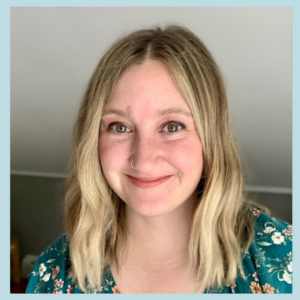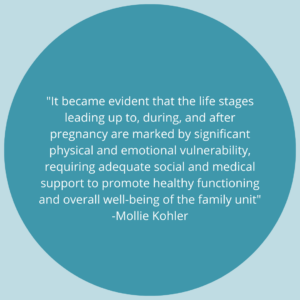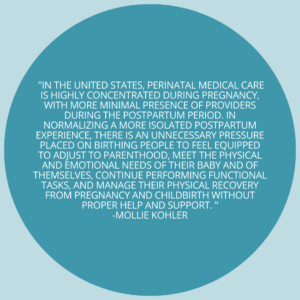#UMNMCH student Mollie Kohler, she/her (MPH 2023) wrote this reflection on how her experience as a social worker led her to the MCH program and prepared her for a deployment with the UMN Extension Center for Family Development where she worked on a project to improve culturally relevant postpartum social support and maternal well-being.
Path to The UMN MPH MCH Program
Prior to beginning the Maternal and Child Health MPH Program, I was working in child welfare for a suburban metro county. I had recently completed my Master of Social Work degree and was beginning to develop a focused interest in perinatal mental well-being and its impact on the overall health of a pregnancy, including birth outcomes and postpartum functioning. I transitioned to a perinatal social work role at a large metro hospital, providing social and emotional support to pregnant people and parents with infants admitted to the Newborn Intensive Care Unit. In this role, I was exposed to the dynamic experiences of pregnancy, birth, and postpartum within a population diverse in race, socioeconomic status, and values surrounding birth and parenting. While the specific medical or social needs during pregnancy vary across the diverse patient population, the needs for compassionate medical care, relevant social support, and the presence of a community in which one feels safe and accepted are universal. It became evident that the life stages leading up to, during, and after pregnancy are marked by significant physical and emotional vulnerability, requiring adequate social and medical support to promote healthy functioning and overall well-being of the family unit.
Wellness Intern Deployment
In 2022, I began my deployment with the Center as a wellness intern working with Cari Michaels, MPH, Extension Educator from UMN Extension’s Center for Family Development, under the general supervision of Sara Benning, MLS, Director of the MCH Center for Leadership Education. This project was supported by the University of Minnesota’s newly-created Telehealth Outreach Center, which is now housed within the Institute on Community Integration and the Masonic Institute on the Developing Brain, and in partnership with the Minnesota Association for Children’s Mental Health (MACMH), with support from Lauren Moberg. The original intention of the project was to create a new telehealth training curriculum for pregnant and new parents with content related to mental wellness, self-care, and child development.
The 40-Day Project
Shortly after beginning the deployment, the focus of the project shifted to developing content and a supportive platform specifically for Somali birthing people, and the 40-Day Project was born. This shift took place when initial meetings with community perinatal social service providers highlighted a gap in supportive services for Somali birthing people. This gap was identified via interviews with Somali parents as part of a community assessment conducted by Ellison Center educator, Tracy Schreifels, LMFT, IMH-E, and was confirmed by relevant literature and personal anecdotes of community members. Through a more in-depth review of the literature and conversations with Somali parents, themes of loneliness and unmet expectations for postpartum support were found. A lack of expected social support postpartum has been associated with negative impacts on mental well-being (Binder, P., Johnsdotter, S., Essen, B., 2013; Missal B, Clark C, Kovaleva M., 2016; Hill N., Hunt E., Hyrkäs K., 2012). With this population specified as the target audience, the team expanded to include Somali parent advisors, Ifrah Nur, Maryan Ali, and Sahro Abdullahi, who were integral in the planning, development, and implementation of the content.
The 40-day project is an online educational platform with a variety of resources, educational content, and interactive material focused on the topic of parental well-being in the early postpartum period, specifically the first 40 days postpartum. The first 40 days postpartum is known to be a sacred time in Somali culture for birthing parents to focus on rest, recovery, and receiving support from loved ones (Binder et al., 2013, Missal et al, 2015). The content was developed for an intended audience of Somali birthing people and the medical and social service providers who serve them during pregnancy and after birth. Materials were created specifically for Somali parents but with relevance to wider postpartum populations, and many of the resources have been translated into Somali, with more to come as resources allow. The content includes videos, PDF infographics, parent reflection questions, videos, trauma resources, and mental health crisis information. The content is presented across five modules: normalizing the postpartum experience, mental well-being, building your social network, self-care, and looking forward. In addition to the educational materials and resources, a text message campaign was created to provide 40 messages of affirmation to a new parent over the course of 40 days. Gift boxes with culturally relevant postpartum support items were also sourced and are available for expecting and new parents.
The goals of this intervention were to increase awareness and understanding of the concept of mental well-being in the context of new parenthood, to improve access to postpartum support materials for Somali parents, to streamline access to screenings and handouts for medical and social service providers, and to promote mental wellness in the Somali perinatal community. My roles in the project included background research, content creation, community outreach, evaluation, and resource gathering. Specifically, I was responsible for the creation of parental reflection questions, provider scripts for discussing well-being with patients, and a series of digestible content related to parental mental load, self-care, and building a support system.
Equity Framework
To gain an understanding of cultural norms related to pregnancy, birth, and postpartum care in Somali culture in comparison to standard practices of care in the United States, an initial review of the literature was conducted. As referenced earlier, the findings were reflective of significant differences in the amount and type of support and care that is offered to a parent after giving birth, with postpartum support and care in the United States paling in comparison to East African countries (Binder, 2013, Missal et al, 2015). For Somali immigrants in Minnesota specifically, a loss of social support has been reported as a primary stressor during the postpartum period. Additionally, there are major cultural differences in the role of female family members in supporting the birthing person after birth (Missal et al, 2015). In the United States, perinatal medical care is highly concentrated during pregnancy, with more minimal presence of providers during the postpartum period. In normalizing a more isolated postpartum experience, there is an unnecessary pressure placed on birthing people to feel equipped to adjust to parenthood, meet the physical and emotional needs of their baby and of themselves, continue performing functional tasks, and manage their physical recovery from pregnancy and childbirth without proper help and support. This is a great disservice to all parents, but especially to those who have experienced an alternative way of being cared for or with culturally different values around how to appropriately support someone who has just given birth. The 40-day project seeks to provide a virtual space that offers validation, education, and connection to resources for parents who may be feeling the impact of inadequate social support during the tender, yet powerful postpartum days.
Biography
Mollie Kohler is a part-time fourth-year MCH MPH student. Her background is in perinatal social work and maternal mental health. Mollie received her bachelor of arts degree in Spanish Studies from the University of Minnesota, followed by a Master of Social Work degree also from the University of Minnesota. She holds her independent clinical social work license and currently works as a psychotherapist with certification in perinatal mental health. She is also a mother to two young daughters. In her spare time, she enjoys cooking, spending time outdoors, and connecting with her family. After graduating, Mollie hopes to integrate her public health education and social work/mental health background to work with the perinatal population at both an individual and a community/systemic level. She hopes to focus on providing individual support to achieve mental well-being during the perinatal life stage and advocating for program and policy change to break down systemic barriers that make it difficult to experience postpartum wellness.
References
Binder, P., Johnsdotter, S., Essen, B., (2013). More than re-establishing the partner relationship: Intimate aftercare for Somali parents in diaspora. Midwifery (29), 863-870.
Hill N., Hunt E., Hyrkäs K. (2012). Somali immigrant women’s health care experiences and beliefs regarding pregnancy and birth in the United States. Journal of Transcultural Nursing, 23, 72-81.
Missal B, Clark C, Kovaleva M. (2016). Somali Immigrant New Mothers’ Childbirth Experiences in Minnesota. Journal of Transcultural Nursing, 27(4):359-367. doi:10.1177/1043659614565248.
Royer PA, Olson LM, Jackson B, Weber LS, Gawron L, Sanders JN, Turok DK. (2020). In Africa, There Was No Family Planning. Every Year You Just Give Birt”: Family Planning Knowledge, Attitudes, and Practices Among Somali and Congolese Refugee Women After Resettlement to the United States. Qual Health Res. \30(3):391-408. doi: 10.1177/1049732319861381. Epub 2019 Jul 26. PMID: 31347453; PMCID: PMC7219277.
–Read Student Spotlight archives
Interested in learning more about getting a degree in MCH? Visit our MCH Program page for more information.
#UMNMCH #UMNproud #UMNdriven


